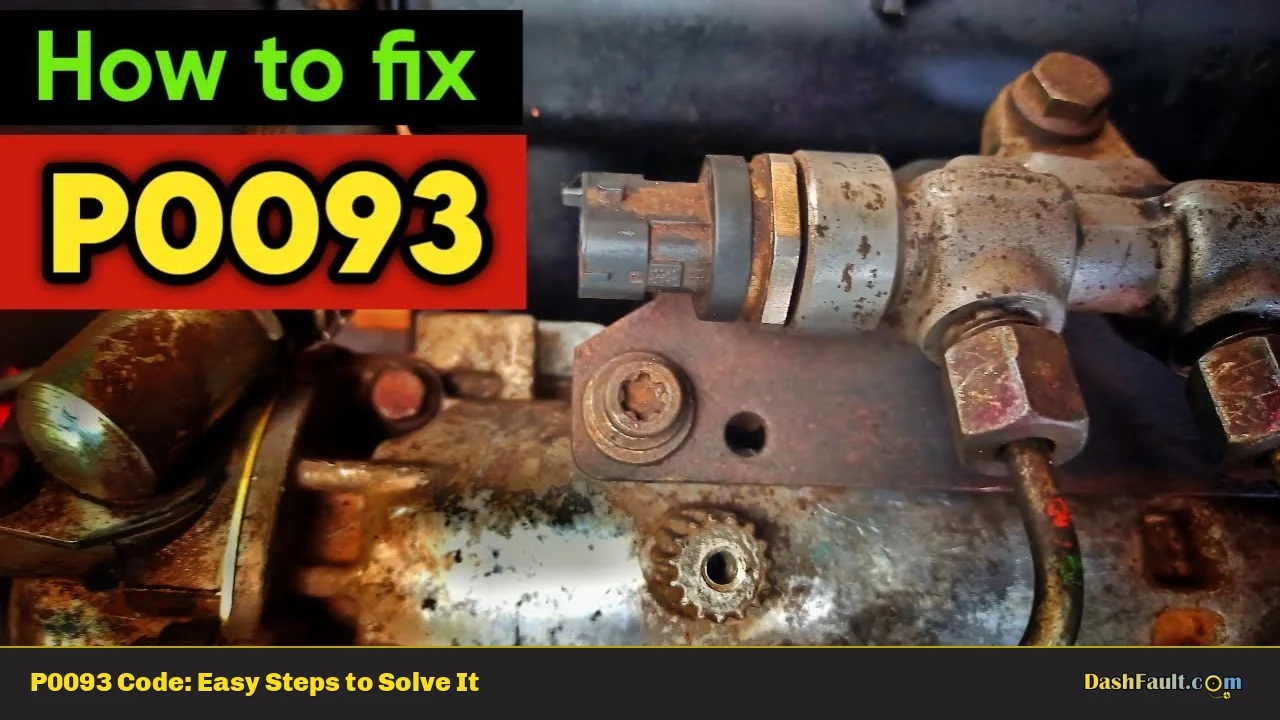The P0093 trouble code is a diagnostic trouble code (DTC) that indicates a “Fuel System Large Leak Detected.” This code is triggered when the powertrain control module (PCM) identifies a significant drop in fuel pressure within the fuel system, suggesting that there is a substantial leak on the high-pressure side. Such leaks can lead to various performance issues, including poor fuel efficiency and engine stalling. Understanding and addressing this code is crucial for maintaining vehicle safety and performance.
| P0093 Code Meaning | P0093 Code Common Causes |
|---|---|
| Fuel System Large Leak Detected | Malfunctioning fuel injector |
| Significant drop in fuel pressure | Leak in fuel line or common rail |
| Potential engine performance issues | Failed fuel pressure sensor |
| Risk of fire hazard | Faulty fuel pump or lift pump |
| Vehicle may enter fail-safe mode | Malfunctioning fuel pressure regulator |
| Blocked fuel filter | |
| Loose or damaged connections in the fuel system | |
| Fuel temperature sensor issues | |
| Electrical wiring problems related to the PCM or injectors |
Symptoms of P0093 Code
When the P0093 code is triggered, vehicle owners may experience several symptoms:
- Illuminated Check Engine Light: The most immediate indication of a problem.
- Decreased Engine Performance: The vehicle may struggle to accelerate or maintain speed.
- Engine Stalling: The engine may shut off unexpectedly, especially under load.
- Vehicle Will Not Start: In severe cases, the vehicle may become inoperable.
- White Smoke from Exhaust: Particularly in diesel engines, indicating incomplete combustion.
- Decreased Fuel Efficiency: Increased fuel consumption due to improper fuel delivery.
Technical Explanation
The P0093 code is part of the On-Board Diagnostics II (OBD-II) system that monitors various aspects of vehicle performance. When the PCM detects a significant drop in fuel pressure, it logs this code to alert the driver of potential issues. This drop can occur due to various reasons, including leaks in the high-pressure fuel lines, faulty sensors, or malfunctioning components within the fuel system.
Step-by-Step Diagnosis
Diagnosing the P0093 code involves several steps:
- Visual Inspection: Begin with a thorough inspection of the fuel system components for visible signs of leaks, damage, or loose connections.
- Check Fuel Pressure: Use a fuel pressure gauge to measure the pressure within the system while the engine is running. Compare this reading against manufacturer specifications.
- Inspect Sensors: Test the functionality of the fuel pressure sensor and other related sensors to ensure they are providing accurate readings.
- Examine Fuel Lines and Connections: Look for cracks, corrosion, or wear in hoses and fittings that could lead to leaks.
- Check for DTCs: Use an OBD-II scanner to check for any additional trouble codes that may provide further insight into related issues.
Solution Methods
Addressing a P0093 code typically involves one or more of the following solutions:
- Repair or Replace Leaking Components: If leaks are found in hoses, lines, or connections, repair or replace these parts as necessary.
- Replace Faulty Sensors: If testing reveals that sensors are malfunctioning, replace them to restore proper function.
- Fuel System Cleaning: In cases where blockages are suspected (e.g., clogged filters), perform a cleaning or replacement of affected components.
- Check Fuel Pressure Regulator: Ensure that this component is functioning correctly; replace if necessary.
Cost Estimates
The cost for repairs associated with a P0093 code can vary widely based on several factors:
- Visual Inspection and Diagnosis: $100 – $150 at a shop.
- Fuel Line Repairs: $50 – $300 depending on the extent of damage.
- Sensor Replacement: $100 – $200 for parts and labor.
- Fuel Pump Replacement: $300 – $800 depending on vehicle make and model.
Warnings and Recommendations
Addressing a P0093 code should not be delayed due to safety concerns associated with fuel leaks:
- Immediate Attention Required: A large fuel leak poses serious safety risks, including fire hazards. If you suspect a leak, avoid driving the vehicle until it has been inspected and repaired.
- Professional Help Recommended: While DIY diagnostics can be performed, complex issues related to fuel systems often require professional expertise. Consult with a certified mechanic if you’re unsure about any steps in the diagnosis or repair process.
Closing Paragraph
The P0093 trouble code signifies a serious issue within your vehicle’s fuel system that requires immediate attention. By understanding its symptoms, causes, and solutions, vehicle owners can take proactive steps toward diagnosing and resolving this code effectively. Whether through DIY methods or professional assistance, addressing this issue promptly will help ensure both safety and optimal vehicle performance.
Frequently Asked Questions About P0093
- What does the P0093 code mean?
The P0093 code indicates that the powertrain control module has detected a large leak in the fuel system. - What are common symptoms of a P0093 code?
The symptoms include an illuminated check engine light, decreased engine performance, stalling, and poor fuel efficiency. - How serious is the P0093 trouble code?
This code is serious as it indicates potential safety hazards due to large fuel leaks which can lead to fires. - Can I drive my car with a P0093 code?
No, it is not advisable to drive with this code as it poses significant risks; repairs should be made immediately. - What could cause a P0093 code?
Common causes include malfunctioning injectors, leaks in hoses or lines, faulty sensors, and issues with the fuel pump. - How do I diagnose a P0093 code?
The diagnosis involves visual inspections for leaks, checking fuel pressure with gauges, and testing relevant sensors. - Is professional help necessary for fixing P0093?
While some repairs can be DIYed, professional assistance is recommended for complex issues related to fuel systems. - What are potential costs associated with fixing a P0093 code?
The costs can range from $100 for diagnostics up to $800 for major repairs like pump replacements.
